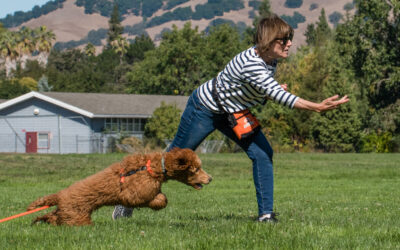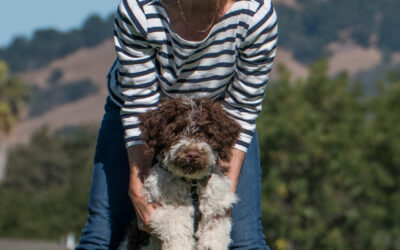The Importance of Socializing Your Puppy
Start Early – Go Everywhere
There is a magic window that opens in every puppy’s life, when he is most confident and accepting of new experiences, dogs, people, places. The length of this sensitive period is short; usually within the first three months. This is the time to get him outside, to go everywhere you can and introduce him to everyone you meet, allow them to pet and handle your little one gently and give him treats. This doesn’t mean he’ll be less protective later on, but it will help him get used to new places and take new experiences in stride. When this window closes, between the ages of 12 and 14 weeks you may even notice him becoming more cautious of other dogs, new people. This is why the longer you wait to socialize a puppy, the more stressful it can be for him.
When To Socialize
Socialization should begin the moment your new puppy comes home, which is usually between 8 and 12 weeks old. Many years ago conventional wisdom dictated waiting till puppies had all of their shots. Today we know that puppies carry adequate levels of their mother’s antibodies in their systems for many weeks following birth, providing adequate protection during their first few months. During this critical time (usually between the 3 and 12 weeks old, sometimes longer) puppies are wired to calmly accept new experiences and life lessons. Barring any traumas or early frights they remain confident and accepting of everything they see and learn during this time. Once it ends, it’s as if a window closes and your puppy will begin to show caution and restraint, even fear in new situations. You can always socialize a puppy or dog, but it will never be as easy and stress-free as it is during this period in your puppy’s life.
How to Socialize
There is an optimal way to socialize a puppy and that’s with training. There are important skills to teach your puppy prior to going out with him. In our Jumpstart Your Puppy Program we teach puppies to sit at 8 and 9 weeks old. In fact, you can teach a 9 week-old puppy to sit for everything he wants, be it attention, a treat or to go outside. Now that he knows how to sit you can take him outside and practice this important skill everywhere you go.
Teaching your puppy to sit for everything is a lot like rebooting a computer. Now, when he gets excited, over-stimulated, fearful or simply confused have him sit for you. Once you have his attention again you can redirect him. As you practice the sit away from home you’ll notice something wonderful happening; when your puppy sits for you he is learning how to regulate his energy downward at will – an important skill for every dog to have. He is also learning to focus on you in strange situations. This will make taking him to new places enjoyable for you both and you’ll be surprised at how confident he’ll become at a young age. Without a doubt, a well-socialized puppy is well on his way to maturing nicely, taking changes in stride and becoming a wonderful companion.
We at Hillary’s Hounds agree with the American Veterinary Society of Animal Behavior: Socializing your puppy can – and should take place before they are fully vaccinated (italics ours).
Have a look at the AVSA statement (PDF).
According to the American Veterinary Society of Animal Behavior, the primary and most important time for puppy socialization is the first three months of life. During this time puppies should be exposed to as many new people, animals, stimuli and environments as can be achieved safely and without causing overstimulation that can manifest as excessive fear, withdrawal or avoidance later on.
What If You Don’t Socialize Your Puppy?
Socializing your puppy may be the most important aspect his education. Get it right and you’ll have a dog you can take anywhere with confidence. Ignore this part of a dog’s education and you’ll find yourself leaving him home or in a locked car because he’s unmanageable. The sad fact is, most of the aggression, fear, shyness and other serious behavior problems we see in adult dogs are a result of under-socialization during puppyhood. The good news is, it’s never too late to start.
Can you teach an old dog new tricks? Yes! We do it every day.



